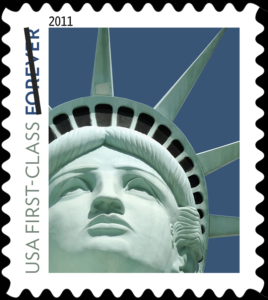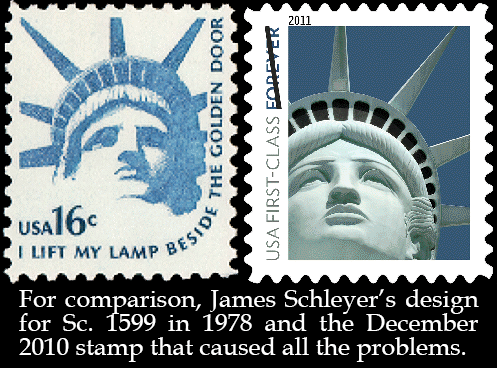by Lloyd A. de Vries
What were they thinking? Awarding $3.5 million dollars to the sculptor of a Las Vegas replica of the Statue of Liberty, because the U.S. Postal Service used a photograph of it on a stamp.
 I’m often critical of the USPS, but this decision makes no sense to me. The justices say the agency made $2.1 billion from the sale of 4.9 billion stamps. That’s the gross, at 44 cents per stamp. The printing cost is a small fraction of the selling price, but a stamp represents a payment, whether it’s a tax on alcohol or playing cards, or, in the case of postage stamps, for delivering a piece of mail.
I’m often critical of the USPS, but this decision makes no sense to me. The justices say the agency made $2.1 billion from the sale of 4.9 billion stamps. That’s the gross, at 44 cents per stamp. The printing cost is a small fraction of the selling price, but a stamp represents a payment, whether it’s a tax on alcohol or playing cards, or, in the case of postage stamps, for delivering a piece of mail.
Stamps like this one are called definitives, and are the workhorses of postage stamps: Unlike stamps for celebrities or ice pops or other pop culture, which are aimed at collectors and aficionados of the subjects, definitives are intended to carry the mail. Yes, first-class mail service shows a profit, but not 43 cents out of 44!
Perhaps Judge Eric Bruggink’s dog was bitten by a mailman.
 Most of us would be thrilled to see our work on a postage stamp, nationally distributed through more than 30,000 retail outlets and ending up in millions of homes and businesses.
Most of us would be thrilled to see our work on a postage stamp, nationally distributed through more than 30,000 retail outlets and ending up in millions of homes and businesses.
Davidson and his attorney were no doubt encouraged by another sculptor’s successful lawsuit against the USPS. He created a sculpture for the Korean War Veterans Memorial on the National Mall in Washington. The USPS showed the sculpture — which was commissioned and purchased by the U.S. Park Service — on a stamp, the artist sued, and the USPS was ordered to pay damages.
Did Davidson pay royalties to the Park Service for his version of the Statue of Liberty? No, of course not. Legally, he is not required to do so. A purely federal agency like the Park Service can’t copyright anything. (The Postal Service is a corporation owned by the government, and therefore can claim copyrights.) Parody — such as a half-size replica using your mother-in-law’s face — is also protected from copyright.
Apparently, the USPS was faulted by the Federal Claims Court not so much for using the wrong image, but for not immediately pulling the stamp off sale and out of its tens of thousands of retail outlets.  The mistake, as well as other incorrect stamp designs (the wrong African-American cowboy’s picture, putting the Grand Canyon in the wrong state, and, of course, the Korean War Veterans Memorial stamp), are affecting my part of stamp collecting: The USPS now triple-checks everything, runs it all past attorneys, then triple-checks everything again, and first day cover collectors and servicers are getting information about new issues later and later. “Even though George Washington had no children of his own, have we checked all the descendants of his stepdaughters to see if we have permission to use ‘Washington’ in a postmark?”
The mistake, as well as other incorrect stamp designs (the wrong African-American cowboy’s picture, putting the Grand Canyon in the wrong state, and, of course, the Korean War Veterans Memorial stamp), are affecting my part of stamp collecting: The USPS now triple-checks everything, runs it all past attorneys, then triple-checks everything again, and first day cover collectors and servicers are getting information about new issues later and later. “Even though George Washington had no children of his own, have we checked all the descendants of his stepdaughters to see if we have permission to use ‘Washington’ in a postmark?”
The Postal Service is everyone’s favorite whipping boy. It’s even part of our lexicon: “The check is in the mail,” we say, when it really hasn’t even been written.
Conservatives in particular love to attack the Postal Service. They would like to see it privatized, as in other countries, although it hasn’t always worked well. The U.S. Constitution requires that the federal government provide mail service. The USPS also delivers to every address in one of the biggest countries in the world, and for far less than most other countries’ postal agencies.
Listen to what Judicial Watch, a conservative foundation which has described climate science as “fraud science,” had to say about this case:
“Even for the beleaguered U.S. Postal Service (USPS), a bastion of mismanagement, this appears to be a new low…
“Profiting from an artist’s stolen work is simply the latest of many transgressions committed by the USPS in recent years.”
In the article, Judicial Watch calls the USPS “a perpetually troubled government agency notorious for its egregious spending sprees and dire financial woes” and “a bastion of mismanagement.”
Ouch!
But even the liberal Washington Post couldn’t help smirk about the decision. Three days after running the just-the-facts-ma’am Associated Press story, a WaPo “Post Nation” column played it as a soap opera.
“They met totally by accident … It was like the premise of a rom-com,” wrote Avi Selk, referring to a romantic comedy.
Even non-collectors have come up to tell me, and perhaps chortle, about the USPS mistake that may cost it $3.5 million.
I hope it doesn’t. I hope the U.S. Postal Service appeals the decision, or at the very least, sues Getty Images (to whom it paid $1,500 for use of the photograph on the stamp) for failing to label it properly.
And when Judicial Watch or the Washington Post wonder why its mail is taking longer to arrive, someone will point out the USPS had to cut corners somewhere to come up with that $3.5 million.




Very well put. I hope they sue Getty as well. If I was the artist, Getty is who I would have gone after, if I was that upset. They were the ones who sold the image for commercial use…
Draft the LAWYERS into the C.C.C. Some Road-Crew time is what they need.
The Vegas sculptor says he didn’t sue for the money. I haven’t heard him say he’d give any if it back, though.
I’m no lawyer, but if a statue is on display publicly and I take a photograph of it, then sell the IMAGE… isn’t that my property? I concur with others’ comments, the fault lies with the photographer if he/she sold the image without properly identifying it. It appears the sculptor jumped over that bit of law, just so he could attach a big suit to a big federal wallet. I guess he figured that he couldn’t spill a hot cup of coffee on his own lap and sue; that’s already been done. ~TH~
The replica was intended to invoke the iconic image of the statue of liberty, which is in the public domain. Minor departures from the original should not create copyright status in the creator of the replica.